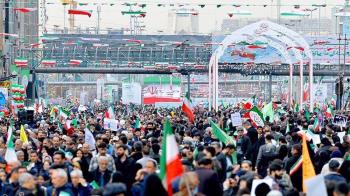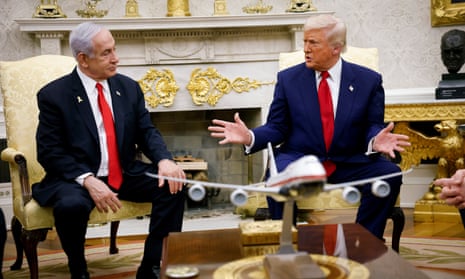Alwaght- At a time the Israeli Prime Minister Benjamin Netanyahu as a war criminal is wanted by the International Criminal Court Court (ICC) and in the past months has rarely made foreign visits for the fear of arrest, the sensitive regional conditions and Gaza crisis and the developments in Israel have motivated him to visit the US for talks with Trump again after a short time of his last visit to Washington; talks that can be decisive due to the American central role in Gaza war as the main backer of the Israeli regime and influencer of the regional developments.
But despite the high expectations of the Israeli officials about making strategic or political success from the visit, it ended without any tangible gains, with many Israeli media describing it a fiasco.
According to Israeli media reports, Benjamin Netanyahu's trip to the US and his negotiations with Donald Trump on three key issues— the abolition of US tariffs on Israeli exports, the continuation of the Gaza war, and Iran nuclear negotiations— did not achieve their intended goals, with Netanyahu's political opponents, including members of the Meretz party, calling the visit a "fruitless propaganda trip" that cost Israel dearly.
Hebrew media reports and analyses
A majority of the Israeli media described the visit a kind of "diplomatic failure", not only having not helped to decrease or eliminate tariffs on Israel, but also Netanyahu failed to win support for Gaza war or possible military action against Iran, as claimed by these media outlets.
Prominent Israeli media outlets such as Haaretz and Yedioth Ahronoth considered the trip a "missed opportunity" for Netanyahu, as he failed to obtain tangible guarantees from Trump.
The conservative-leaning Israel Hayom newspaper wrote about the failure of the Israeli delegation to understand Trump's positions on negotiations with Iran: "The Israeli political leadership is trying to reduce the shock by saying that they were aware of the possibility of such negotiations, because Trump has always spoken of his willingness to negotiate on the Iranian nuclear issue."
A source in the Israeli delegation told the newspaper: "The shock was clearly visible on the faces," adding: "The latest information given to Netanyahu yesterday indicated that Israel would be included in the content of the negotiations, which is a very positive aspect."
Itamar Eichner, a political analyst for the right-wing newspaper Yedioth Ahronoth, wrote that Trump and Netanyahu's statements after their meeting at the White House showed that Netanyahu's hasty invitation to Washington was not because of the tariffs, but because of "the start of US negotiations with Iran."
The newspaper has also reported that Trump’s response to Netanyahu regarding the 17 percent US tariffs on Israel was "harsh and even somewhat humiliating ." Netanyahu, who had flown directly from Hungary to Washington, returned virtually empty-handed.
Eichner wrote: "The Israeli prime minister did not receive the gift he was looking for. Trump not only did not announce that he would reduce or eliminate the tariffs, but also said that the US gives Israel $4 billion in aid annually, more than any other country in the world."
Calcalist newspaper wrote in a report titled" Netanyahu Failed to Convince Trump to Lift Trade Tariffs” that Trump said “we give billions of dollars to Israel every year.”
Kan newspaper also reported that "what initially seemed like a friendly meeting quickly turned into a show of force by Trump, leaving Netanyahu with no diplomatic gains, no progress on the hostage issue, and no answers about the Iran-US negotiations that are taking place behind the scenes."
Netanyahu's heavy bills for the US
Though the Israeli media talked about Israeli PM failing to realize his visit goals in talks to Trump, they did not specify why the US did not show fresh flexibility to Netanyahu’s demands. The main reason for this development is on the one hand the heavy economic, military, and political bills of Netanyahu for Washington over the past years which run counter to Trump's commercial look to the foreign policy and on the other hand the White House awareness of the swamp Netanyahu is struggling in and wants to get rid of using Trump. But everyone knows that the US alignment with Netanyahu's military ambitions especially in relation to Iran will have no good consequences to the US's West Asia policy and interests.
Trump's hidden dissatisfaction with the economic costs that Netanyahu's warmongering has imposed on Washington over the past two years can be seen in his unwillingness to suspend or reduce economic tariffs on Israeli goods, where Trump sarcastically spoke of the $4 billion in US aid to Israel to show that Tel Aviv's heavy military costs in the wars with Gaza and Lebanon and US involvement in the war with Yemen in the Red Sea, which cost the US much higher than the alleged $4 billion - have displeased Trump.
Netanyahu used the US’s economic and military credibility, budget, and prestige for two years by assuring Washington that he could completely dismantle the Hamas movement and free the prisoners with a massive military offensive on Gaza, but in the end he was forced to accept a ceasefire agreement with Hamas to free the prisoners. During the prisoner swap, the lies of Tel Aviv’s top military and political leaders about destroying Hamas’s power were exposed, and the Palestinian resistance groups demonstrated with a show of force that Trump’s dreams about taking control of Gaza and exploiting its economic opportunities to compensate for American extensive costs in the war were impossible. In these circumstances, Netanyahu once again traveled to Washington with a repeated promise to try to destroy Hamas in order to resolve the political crises within the cabinet and the pressures related to handling corruption cases by gaining Trump’s support for continuing the war. This is an issue that Trump did not agree to this time because he is tired of injecting money into the well of Netanyahu's demands. Actually, he does not want the shadow of the Gaza war to overshadow his trip to Saudi Arabia in the coming weeks, and Netanyahu does not have a strong position inside the occupied territories and does not want to bet on the wrong horse.
Concerning the negotiations with Iran, certainly Trump's views to the demands of Israel and Netanyahu personally cannot be without an understanding of their challenges to the progress of negotiations with Tehran and the risks of tendency of Netanyahu to drag the US to the miscalculation of military confrontation with Iran.
Firstly, Iran is completely skeptical of the goodwill and will of the American side due to the experience of the US unilateral withdrawal from the 2015 nuclear agreement, officially called Joint Comprehensive Plan of Action (JCPOA), during the first term of the Trump presidency and the decline to lift sanctions. As a result, the interventionist role of the Israelis during the negotiations will add to this skepticism.
Secondly, Tehran has repeatedly announced that it will negotiate purely on the nuclear issue and the lifting of sanctions. Just as it has been transparent so far on the issue of the International Atomic Energy Agency's extra-safeguards monitoring and no deviation has been observed in the peaceful nature of Iran's nuclear program as confirmed by this organization and US intelligence agencies, the door to talks on confidence-building in exchange for the lifting of sanctions is open.
But Iran has declared a red line any negotiations on its legitimate defense capabilities or its principal policies in relation to its regional allies. This is while Netanyahu's talking of adoption of Libya model in the talks with Tehran is practically a violation since the beginning and will increase Iran's pessimism about the US Trump's motivations for talks.
Thirdly, although Trump has consistently maintained his threatening tone, he and the White House's military and political strategists certainly know very well that opening a military confrontation with Tehran will unleash many uncertain consequences, and according to Iranian officials, this will only compound Iran's nuclear program and entangle Trump in a major regional and international crisis, and since nuclear technology is completely indigenous in Iran, no one will be able to dismantle it. Therefore, Netanyahu's pressures to lead the US into the miscalculation of a military confrontation with Iran cannot have gone unnoticed by Trump.



























